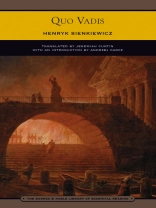Quo Vadis is a powerful historical novel about the rise of Christianity in the Roman Empire. Through a romance between a high-born Roman pagan and a Christian woman, Henryk Sienkiewicz masterfully brings to life the decadence of imperial Rome during the reign of Nero Claudius Caesar (AD 54-68), the bloodthirsty persecutor of the early Christians.
Quo Vadis has been translated into more than forty languages, as well as adapted into several movies. Jeremiah Curtins accurate and lively English translation of the novel successfully conveys Sienkiewiczs muted portrayal of the beginnings of Christianity and his spectacular, apocalyptic vision of the Roman Empire in decline.
Об авторе
Born in Poland in 1846 and educated in Warsaw, Henryk Sienkiewicz published his first literary works in 1872. Sienkiewicz was also a successful journalist, a social and political activist, and a Polish patriot. After his wife died from tuberculosis, Sienkiewicz established a foundation and an artists fund that was devoted to helping artists and writers suffering from the disease. But Sienkiewicz also wrote novels, short stories, and essays while abroad, and many of his works were inspired by his travels. He was furthermore very active politically, writing protests against the policies of Prussia and Russia toward Poland. Sienkiewicz was awarded the Nobel Prize for Literature in 1905. He spent his final years in Switzerland, where he continued to work on behalf of the Polish people, co-organizing the Swiss central committee of an organization devoted to helping Polish victims of World War I. He died in Switzerland in 1916.












